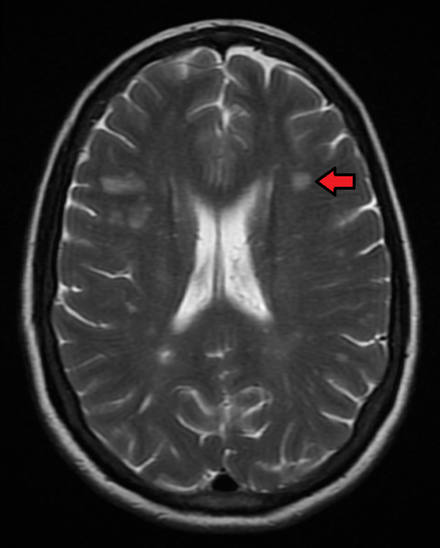Multiple Sclerosis
Multiple sclerosis (MS) is an autoimmune disease that damages the myelin sheaths around nerve cells in the brain and spinal cord. This disruption affects the nervous system's ability to transmit signals, resulting in a variety of physical, mental, and sometimes psychiatric symptoms.
The disease is characterised by either isolated attacks (relapsing forms) or a steady progression of disability (progressive forms).

Signs and Symptoms
MS lesions can impact any part of the central nervous system, leading to a wide array of neurological symptoms. Common symptoms include fatigue, visual problems, motor and sensory issues, autonomic disturbances, and cognitive impairments.
Specific symptoms vary based on lesion locations and may include:
- Sensory changes: Tingling, numbness, or pain in limbs.
- Motor issues: Muscle weakness, spasms, difficulty with coordination and balance.
- Visual problems: Double vision, vision loss, and eye pain due to optic neuritis.
- Autonomic issues: Bladder and bowel dysfunction.
- Cognitive symptoms: Memory problems, slowed information processing, and executive function deficits.

Disease Course
MS may have a prodromal phase with psychiatric and cognitive issues. It often starts as a clinically isolated syndrome (CIS) with symptoms such as motor or sensory problems and optic neuritis.
The disease progresses in two main patterns: relapsing-remitting (85%) and progressive (10-15%).
- Relapsing-remitting MS (RRMS): Unpredictable relapses followed by remission.
- Primary progressive MS (PPMS): Continuous worsening without remission.
- Secondary progressive MS (SPMS): Initially relapsing-remitting, then progressing steadily.
Causes
The exact cause of MS is unknown, but it involves a combination of genetic, environmental, and immune factors. The Epstein-Barr virus (EBV) is linked to MS, and genetic susceptibility, particularly within the HLA region of chromosome 6, plays a significant role.
Environmental factors like low vitamin D levels and geographic location also influence risk.

Pathophysiology
MS is characterised by inflammation, demyelination, and neurodegeneration. The immune system attacks myelin, leading to the formation of plaques or lesions primarily in the white matter.
This results in disrupted signal transmission and subsequent neurological symptoms.

Diagnosis
Diagnosis is based on clinical presentation, supported by MRI and cerebrospinal fluid (CSF) analysis. The McDonald criteria, which require evidence of lesions disseminated in time and space, are commonly used.
MRI shows areas of demyelination, and CSF analysis may reveal oligoclonal bands indicative of chronic inflammation.

Treatment
While there is no cure for MS, treatments aim to manage symptoms, reduce relapses, and slow disease progression. Acute flares are treated with high-dose corticosteroids.
Disease-modifying therapies (DMTs) include interferons, glatiramer acetate, and newer oral medications like fingolimod and dimethyl fumarate, which reduce relapse rates and delay progression. Physical therapy and occupational therapy help manage symptoms and improve quality of life.
Prognosis
The prognosis of MS varies, with better outcomes often seen in women, those with early onset, and those with a relapsing course. Disease-modifying therapies have improved long-term outcomes, reducing relapses and delaying progression.
However, progressive forms of MS have a worse prognosis, with faster disability accumulation.

MS is the most common immune-mediated disorder affecting the central nervous system, with varying prevalence globally, affecting more women than men, and typically presenting between ages 20 and 50.
Self-assessment MCQs (single best answer)
Which of the following best describes Multiple Sclerosis (MS)?
Which of the following is a common initial symptom of MS?
What is the main measure of disability and severity in MS?
[mcq 417.11] Glasgow Coma Scale [wrong 417.11] No, the Glasgow Coma Scale is used to assess consciousness in trauma patients. [end feedback 417.11]
[mcq 417.12] Expanded Disability Status Scale (EDSS) [right 417.12] Correct! The EDSS is used to measure disability and severity in MS patients. [end feedback 417.12]
[mcq 417.13] Mini-Mental State Examination (MMSE) [wrong 417.13] No, the MMSE is used to assess cognitive function, not disability in MS. [end feedback 417.13]
[mcq 417.14] Barthel Index [wrong 417.14] No, the Barthel Index measures performance in activities of daily living, not specific to MS. [end feedback 417.14]
[mcq 417.15] Apgar Score [wrong 417.15] No, the Apgar Score is used to assess the health of newborns, not relevant to MS. [end feedback 417.15]
Which virus is most strongly associated with an increased risk of developing MS?
[mcq 417.16] Human Papillomavirus (HPV) [wrong 417.16] No, HPV is not associated with MS. [end feedback 417.16]
[mcq 417.17] Influenza Virus [wrong 417.17] No, the Influenza Virus is not associated with MS. [end feedback 417.17]
[mcq 417.18] Epstein-Barr Virus (EBV) [right 417.18] Correct! EBV infection is strongly associated with an increased risk of developing MS. [end feedback 417.18]
[mcq 417.19] Hepatitis C Virus [wrong 417.19] No, Hepatitis C Virus is not linked to MS. [end feedback 417.19]
[mcq 417.20] Human Immunodeficiency Virus (HIV) [wrong 417.20] No, HIV is not associated with an increased risk of developing MS. [end feedback 417.20]
Which diagnostic tool is primarily used to identify lesions characteristic of MS?
[mcq 417.21] Computed Tomography (CT) Scan [wrong 417.21] No, CT scans are not typically used to diagnose MS. [end feedback 417.21]
[mcq 417.22] X-ray [wrong 417.22] No, X-rays cannot identify MS lesions. [end feedback 417.22]
[mcq 417.23] Electroencephalogram (EEG) [wrong 417.23] No, EEGs measure brain activity but are not used to diagnose MS. [end feedback 417.23]
[mcq 417.24] Magnetic Resonance Imaging (MRI) [right 417.24] Correct! MRIs are the primary diagnostic tool used to identify MS lesions in the brain and spinal cord. [end feedback 417.24]
[mcq 417.25] Ultrasound [wrong 417.25] No, ultrasounds are not used to diagnose MS. [end feedback 417.25]
What is the purpose of disease-modifying therapies in the management of MS?
[mcq 417.26] To cure the disease [wrong 417.26] No, there is currently no cure for MS. [end feedback 417.26]
[mcq 417.27] To alleviate acute pain [wrong 417.27] No, disease-modifying therapies are not primarily used to alleviate acute pain. [end feedback 417.27]
[mcq 417.28] To reduce the frequency of relapses and slow disease progression [right 417.28] Correct! Disease-modifying therapies aim to reduce relapse frequency and slow the progression of MS. [end feedback 417.28]
[mcq 417.29] To improve digestion and metabolism [wrong 417.29] No, disease-modifying therapies do not target digestion or metabolism. [end feedback 417.29]
[mcq 417.30] To treat secondary infections [wrong 417.30] No, these therapies do not treat secondary infections. [end feedback 417.30]
Which of the following is a characteristic finding in the cerebrospinal fluid (CSF) of MS patients?
[mcq 417.31] Elevated glucose levels [wrong 417.31] No, elevated glucose levels are not a characteristic finding in MS patients. [end feedback 417.31]
[mcq 417.32] Oligoclonal bands of IgG [right 417.32] Correct! Oligoclonal bands of IgG are a characteristic finding in the CSF of MS patients. [end feedback 417.32]
[mcq 417.33] Increased red blood cells [wrong 417.33] No, increased red blood cells are not found in the CSF of MS patients. [end feedback 417.33]
[mcq 417.34] Decreased protein levels [wrong 417.34] No, decreased protein levels are not characteristic of MS. [end feedback 417.34]
[mcq 417.35] Presence of bacterial antigens [wrong 417.35] No, bacterial antigens are not present in the CSF of MS patients. [end feedback 417.35]
Which of the following describes the primary progressive form of MS (PPMS)?
[mcq 417.36] Unpredictable relapses followed by remission [wrong 417.36] No, this describes the relapsing-remitting form of MS. [end feedback 417.36]
[mcq 417.37] Progressive decline from onset without remission [right 417.37] Correct! PPMS is characterised by a progressive decline from the onset of the disease without periods of remission. [end feedback 417.37]
[mcq 417.38] Initial relapsing-remitting course followed by steady progression [wrong 417.38] No, this describes secondary progressive MS, not primary progressive MS. [end feedback 417.38]
[mcq 417.39] Only one single episode of symptoms [wrong 417.39] No, MS typically involves multiple episodes or continuous progression, not a single episode. [end feedback 417.39]
[mcq 417.40] Complete recovery after initial symptoms [wrong 417.40] No, complete recovery after initial symptoms is not characteristic of MS. [end feedback 417.40]
Which factor is NOT considered a risk factor for developing MS?
[mcq 417.41] Smoking [wrong 417.41] No, smoking is a known risk factor for MS. [end feedback 417.41]
[mcq 417.42] Low vitamin D levels [wrong 417.42] No, low vitamin D levels are a risk factor for MS. [end feedback 417.42]
[mcq 417.43] Living closer to the equator [right 417.43] Correct! Living closer to the equator is associated with a lower risk of developing MS. [end feedback 417.43]
[mcq 417.44] Genetic predisposition [wrong 417.44] No, genetic predisposition is a risk factor for MS. [end feedback 417.44]
[mcq 417.45] Epstein-Barr Virus infection [wrong 417.45] No, EBV infection is a risk factor for MS. [end feedback 417.45]
Which of the following treatments is typically used during an acute flare of MS?
[mcq 417.46] Long-term antibiotics [wrong 417.46] No, long-term antibiotics are not used to treat MS flares. [end feedback 417.46]
[mcq 417.47] High-dose intravenous corticosteroids [right 417.47] Correct! High-dose intravenous corticosteroids are typically used to treat acute MS flares. [end feedback 417.47]
[mcq 417.48] Regular physical therapy [wrong 417.48] No, physical therapy is used for long-term management, not acute flares. [end feedback 417.48]
[mcq 417.49] Antidepressants [wrong 417.49] No, antidepressants are not used to treat acute MS flares. [end feedback 417.49]
[mcq 417.50] Vitamin supplements [wrong 417.50] No, vitamin supplements are not used to treat acute MS flares. [end feedback 417.50]
Dentaljuce
Dentaljuce provides Enhanced Continuing Professional Development (CPD) with GDC-approved Certificates for dental professionals worldwide.
Founded in 2009 by the award-winning Masters team from the School of Dentistry at the University of Birmingham, Dentaljuce has established itself as the leading platform for online CPD.
With over 100 high-quality online courses available for a single annual membership fee, Dentaljuce offers comprehensive e-learning designed for busy dental professionals.
The courses cover a complete range of topics, from clinical skills to patient communication, and are suitable for dentists, nurses, hygienists, therapists, students, and practice managers.
Dentaljuce features Dr. Aiden, a dentally trained AI-powered personal tutor available 24/7 to assist with queries and provide guidance through complex topics, enhancing the learning experience.
Check out our range of courses, or sign up now!


